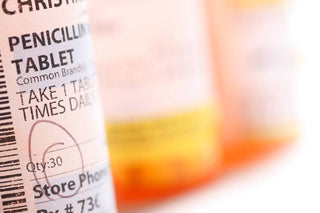When you’re born, you get everything from your parents – your genes, your name, and even your habits. But did you know that you also get your gut bacteria from them?
Yet quite often, both before and after birth, children are given antibiotics that can change the bugs that they get, resulting in some negative long-term effects. What are they?
A study by researchers at New York University Langone Medical Center published in the journal Cell found that this early dose of antibiotics may influence metabolism and lead to later-life obesity.
"When we put mice on a high-calorie diet, they got fat. When we put mice on antibiotics, they got fat. But when we put them on both antibiotics and a high-fat diet, they got very, very fat"
Over the course of five years, researchers conducted a series of experiments on six different mouse models.
For one experiment, they tested low doses of penicillin on three groups of mice. The first mouse group was exposed to antibiotics in the womb during the last week of pregnancy and was given antibiotics throughout their lifetime. The second group was exposed to the antibiotic at weaning and continued through their lifetime. The third group did not receive antibiotics.
Results showed that both groups that received the penicillin experienced increased fat mass. But of the two groups, the mice that had been exposed to antibiotics in the womb had higher body fat levels.
In another experiment, mice were fed a high-fat diet, and those that were given antibiotics became fatter than those that did not receive antibiotics. The mice fed the high-fat diet carried about 5 g of fat on their bodies, but the mice fed both the high-fat diet and antibiotics carried about 10 g of fat – about a third of their body weight.
The mice given a high-fat diet and antibiotics also had higher levels of fasting insulin and saw changes to genes linked to liver regeneration and detoxification, both symptoms of metabolic disorders.
Senior study author Dr. Dr. Martin Blaser, professor of microbiology at the NYU Langone Medical Center, noted “When we put mice on a high-calorie diet, they got fat. When we put mice on antibiotics, they got fat. But when we put them on both antibiotics and a high-fat diet, they got very, very fat.”
To find out the cause of the weight gain – whether it was antibiotics exposure or an altered gut microbiome – the researchers transferred gut bacteria from the mice given penicillin and transplanted it into the guts of 3-week-old mice that were bred to be germ-free and antibiotic-free. A control group, another group of germ- and antibiotic-free mice, had bacteria transplanted from mice not treated with penicillin.
Results showed that the mice that received bacteria from the penicillin-treated mice became fatter than the control group that received bacteria from mice not treated with antibiotics, suggesting that the increased fat mass was a result of changes in the gut bacteria.
In addition, the researchers noted that penicillin did not reduce the amount of bacteria in the gut; instead, the antibiotic eliminated four bacteria important for microbial colonization during infancy: Lactobacillus, Allobaculum, Candidatus Arthromitus, and an unnamed member of the Rikenellaceae family.
Lead researcher Dr. Laura Cox, PhD, of the NYU Langone Medical Center in New York, concluded, "We're excited about this because not only do we want to understand why obesity is occurring, but we also want to develop solutions. This gives us four potential new candidates that might be promising probiotic organisms. We might be able to give back these organisms after antibiotic treatments."
The Bottom Line
It’s not a secret anymore – changes in your gut microbiome can have a lasting impact on your health. But who knew these little bugs could affect your life for life?
The researchers in this study noted that their findings confirm the results of a previous 2012 study, where they discovered that mice given low doses of antibiotics over the course of their lives gained 10 – 15% more body fat and showed altered metabolism in the liver. This is common practice in commercial agriculture, which has been using antibiotics to fatten livestock for some time now.
Still, this doesn’t mean that you should completely swear off antibiotics forever. The study authors are careful to note that doctors shouldn’t stop prescribing antibiotics to children or adults, and quite frankly, antibiotics can still be beneficial for fighting many severe bacterial, not viral, infections.
Always talk to your physician about your treatment options, and see if he or she recommends an alternative to antibiotics. And to avoid illnesses that might require treatment with antibiotics, practice good hygiene and follow proper food safety rules. You’ll be surprised at how effective this can be at keeping illness at bay.
Finally, remember that all bugs aren’t bad. You have more than 100 trillion bacteria on your body at any given moment, even when you’re well. So try to worry less about the bad bugs and instead, focus on promoting the good ones!

